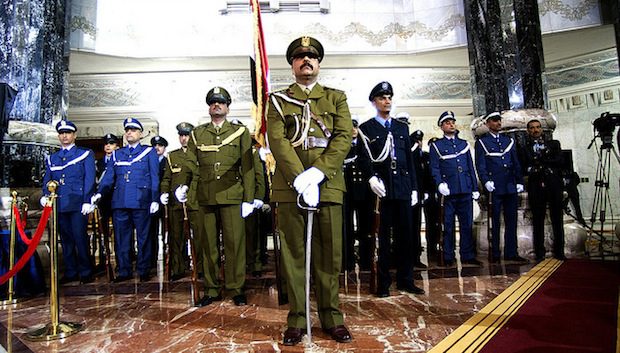The Militias Win Iraq

Achieving Obama’s goals in Iraq rests on two broad strategies. The first, which has little chance of success, is bringing the Sunnis into the fight against ISIS. The second is the creation of an “inclusive” government in Baghdad, one that will pull together the Shias, Sunnis, and Kurds, and maintain the myth that Iraq remains a united nation at its heart. This has been a persistent American goal since the 2003 invasion, one that is impossible to realize in 2014 and thus another indicator of failure for Obama’s war. Here’s why.
The myth of Iraqi unity has had a long run, first in 2003 as a symbol of the democracy the U.S. sought to create, then again in 2006 (remember the purple fingers?) as proof that the war was not actually already lost, and then forever after as the solution to the internecine fighting. As you can see from a recent State Department tweet celebrating “PM Abadi and his full cabinet as they work to unify Iraq against ISIS,” America again imagines it has achieved its interim goal of a balanced government; peace and prosperity must be just around the corner.
But since Haider al-Abadi, the latest prime minister, is a Shia and a former colleague of the once-anointed, now-disappointed former prime minister Nouri al-Maliki, as well as a member of the same political party, little has changed at the top. So hopes for “inclusiveness” falls to the choices to head the key ministries of defense and the interior. And now we know who the winners are.
A Sunni was chosen to lead Defense, a ministry currently in charge of a decrepit Iraqi Army best known for running away at first contact, leaving behind American-supplied weapons for ISIS to re-purpose. Not much joy in that job for now.
The more significant choice is Abadi’s new Interior Minister, Mohamed Ghabban, a little-known Shia politician who is part of the Badr Organization. You remember the Badr folks, or you should, because every Sunni in Iraq does. During the American occupation, the Badr militia ran notorious death squads after infiltrating the same Interior Ministry it now basically heads. They were very effective: as Human Rights Watch quoted one doctor at the time, “Sunnis are a minority in Baghdad, but they’re the majority in our morgue.”
Back in 2009, a SECRET Wikileak-ed State Department cable had this to say about the Badr militia’s leader, Abadi’s first choice for Interior Minister, and the man Ghabban still answers to, Hadi al-Amiri:
Amiri is widely known to have played a leading role in organizing attacks by the Badr Corps militia (the strongest, most disciplined Shia militia at the time and precursor to the current Badr Organization) against Sunnis during the sectarian violence of 2004-2006. Sources indicate that he may have personally ordered attacks on up to 2000 Sunnis. One of his preferred methods of killing allegedly involved using a power drill to pierce the skulls of his adversaries.
As for the choice of Ghabban, a senior U.S. National Security Council leader claimed “Abadi continues to show impressive leadership.” Meanwhile, the Sunnis expressed their view of the appointment. A day after the new Interior Minister was approved, a suicide bomber killed a Shia former Deputy Interior Minister and member of the Badr Organization.
The elevation of a Badr Organization leader to perhaps the most significant cabinet position vis-a-vis the Sunnis is in line with the ever-increasing influence of the Shia militias today.
As much out of necessity (given the limp Iraqi Army) as sectarian politics, the Baghdad government has increasingly called upon Shia militias to defend the city. While they currently seem to be holding off ISIS advances beyond the outskirts of Baghdad International Airport, Shia militias have also abducted and killed scores of Sunni civilians, and they enjoy total impunity, according to Amnesty International. These attacks, as anti-inclusionary of behavior as can be, are being carried out in revenge for Sunni support of ISIS. Scores of unidentified bodies have been discovered across the country handcuffed and with gunshot wounds to the head, execution-style killings meant to send a message.
“By granting its blessing to militias who routinely commit such abhorrent abuses, the Iraqi government is sanctioning war crimes and fueling a dangerous cycle of sectarian violence that is tearing the country apart,” concluded Amnesty.
Two additional points about the Badr Organization: They were responsible for the deaths of many American military personnel during the Occupation, and they remain closely allied with Iran. Journalistic objectivity aside, one must wonder what the souls of dead American servicepeople killed in the previous Iraq war must think about that.
“To give the Interior Ministry to a direct Iranian proxy is huge,” said one researcher specializing in Shia groups. “It shows who the Iraqis are throwing their lot in with.” Indeed, two days after seeing a Shia take over his Interior Ministry, Prime Minister Abadi traveled to Tehran for consultations.
The inclusionary government upon which America’s strategy for Iraq rests is an illusion, as much a Washington fantasy in 2014 as it was in 2003-2011. Everyone—except the U.S. government—can see that now.
Peter Van Buren blew the whistle on State Department waste and mismanagement during the Iraqi reconstruction in his first book, We Meant Well: How I Helped Lose the Battle for the Hearts and Minds of the Iraqi People. His new book, Ghosts of Tom Joad: A Story of the #99Percent, is available now.
Comments